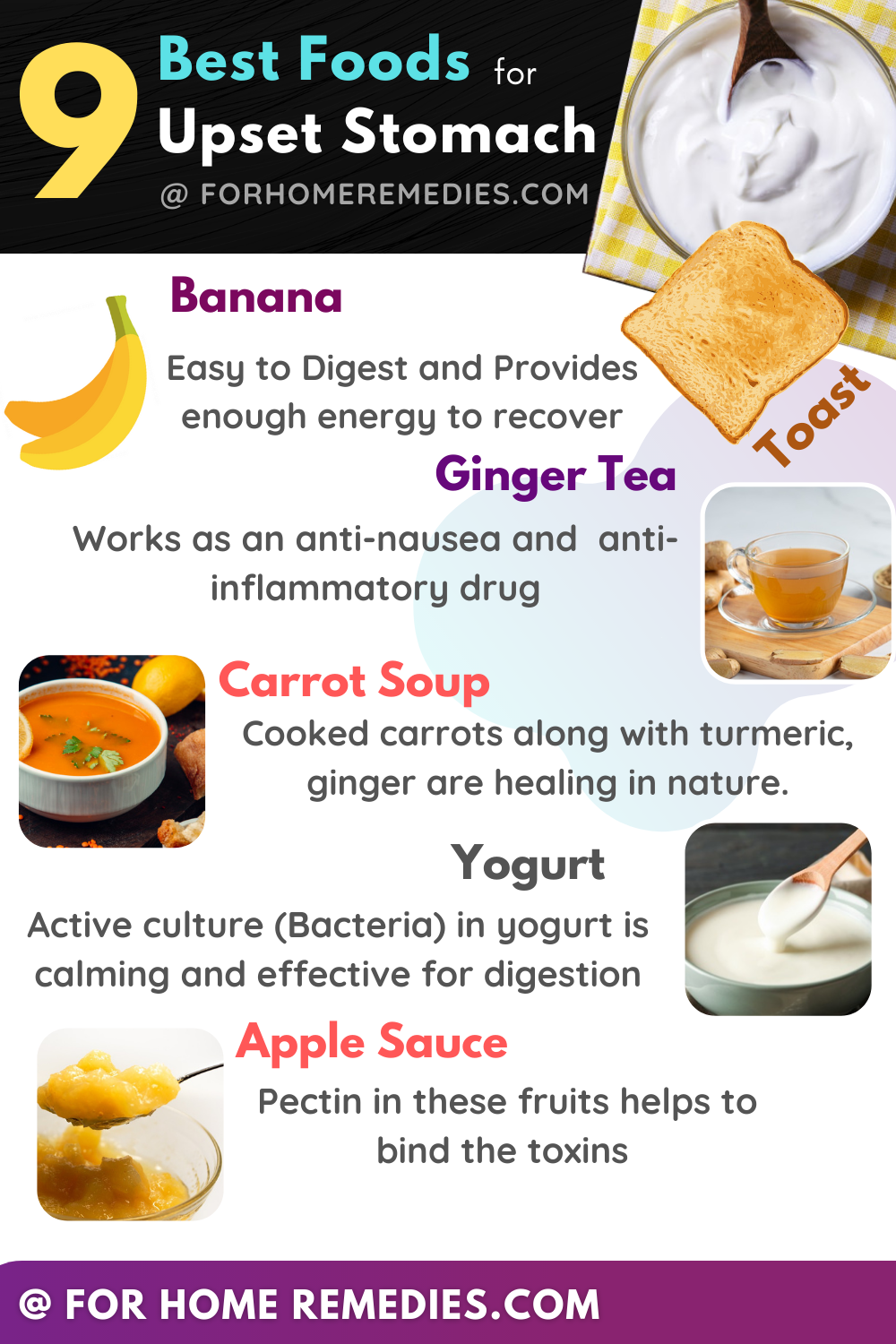Almost everyone has to go through an upset stomach at least once in their lifetime. Chances are a bacterial or viral infection or food poisoning has triggered the issue and your body tries to get rid of the toxic substance.
However, it results in dehydration and your body craves fluid replacement. Though food alone can’t be a remedy, yet it can surely aid you in recovery and replenish your body.
Okay, let’s get into the quick list of foods that can calm down your upset stomach.
Best Foods for Upset Stomach
- Firstly consume more water. Slow sips, take small portions and small bites on whatever you choose.
- Choose foods that are less in fibre and avoid fat. As it will be easy on your system and faster to absorb.
Banana Banana
- This simple fruit is easily digestible, provides enough energy, and helps in the absorption of water in your intestine.
- Apart from that banana contains pectin which naturally restores the function and protects the mucus lining of your intestine.
- Bananas are also known to reduce the risk of high blood pressure and stroke.

Sip Ginger Tea
- Studies have shown that ginger works as an anti-nausea drug and therefore it’s an easy home remedy for travel sickness and loss of appetite.
- Also sipping mild ginger tea aids in the overall health of your digestive system with its anti-inflammatory and digestive properties.
- Apart from that, it’s also proven to be helpful for morning sickness during pregnancy and aids to overcome malaise.
Suggested method: Freshly prepared tea with grated ginger in warm water
Do BRAT Diet
This combo (Banana, Apple, Rice, Roast) helps to ease the symptoms of nausea, vomiting, diarrhea.
Bread toast and rice starch help to make the contents in your stomach firmer, to get rid of the issues related to diarrhoea.
While banana with its magnesium and potassium dose helps to combat the vital mineral loss as a result of dehydration.
And the soluble fibre pectin present in these fruits helps to bind the toxins which harm your stomach.
A low-fat, bland light diet is easy to digest and stay away from high fat and heavy meals.
Soft foods and carbs are nourishing for your body with less acid secretion and require minimal digestion effort.
Ref pectin
Have Fennel Seeds
Fennel seeds help to relieve abdominal discomfort and helps with sluggish digestion.
In other words, it calms down your digestive tract and gives relief from gas, gastrointestinal cramps, and bloating with its antispasmodic properties.
Consuming 5- 7gms of fennel seeds increases your intestinal activity as it helps to absorb the digestive gases and reduces flatulence.
Suggested method: Warm fennel tea
Drink Chamomile Tea
The antibacterial properties of chamomile tea help to fight pathogens, and chamomile also soothes down the gastric mucosa.
Chamomile also eases heartburn or gastritis symptoms and neutralizes the excess acid and gives a calming effect. In other words, chamomile tea is great for gastrointestinal diseases.
Beyond that, it has flavonoids and essential oils which are anti-inflammatory in nature and support strengthening blood vessels.
Drink Enough Water and Electrolyte fluids
Be it vomiting or an upset stomach it is always accompanied by dehydration, which in turn results in fluid imbalance and loss of essential minerals.
This interrupts your system’s proper functioning, so it’s vital to restore the water and electrolyte balance. Drink enough water and electrolyte drinks along with foods that supply your sodium and potassium needs
Gulp Carrot Soup
Raw carrots are healthy but are not that easy for you to digest on an upset stomach however, cooked carrots along with turmeric, ginger are healing in nature.
Its anti-inflammatory properties and easy-to-digest nature act as a remedy for gastrointestinal issues and diarrhoea.
Yogurt
Active culture (Bacteria) in yogurt is calming and effective for digestion and reduces stomach pain.
Plain non-flavored yogurt is so pacifying. In other words, if you are lactose tolerant, consuming yogurt or sipping buttermilk comforts your stomach and helps to restore your immune system.
Apart from these benefits, yogurt is rich in protein, calcium, and probiotics. However, eating yogurt on an empty is a bad idea, rather choose it to follow after light food.
Relax with a gentle massage
Start with a comfortable position by loosening your waistband and lie down on your mattress.
Massage slowly in clockwise circles around your navel, it’s even more effective with chamomile oil or mild carrier oils.
List of drinks and fluids which can help your upset stomach
- H2o – Water: First and the best to hydrate yourself.
- Electrolyte drinks: Restores balance
- Ginger Tea: Anti-inflammatory and healthy digestion
- Chamomile tea: Calms down your system, reduces bloating and tension.
- Raw potato juice: Neutralizes stomach acid
- Rice milk: Protects the stomach lining and fights diarrhoea
- Lettuce leaf tea: Natural antacid to reduce pain
- Broth soup: Protects your stomach lining and is nourishing for your body
- Probiotic foods: Yogurt or buttermilk is easy to digest and increases intestinal good bacteria.
Foods that help to settle your upset stomach
- Bland foods
- Cooked carrots
- Boiled mashed potatoes
- Brat diet
- Bread toast without jam and cream
- Apple sauce
- Non-flavoured yogurt
- Homemade broth chicken soup
- Banana
- White rice and crackers
In other words, Simple carbohydrates are easy to digest and absorbs quickly for faster recovery
Foods that you must avoid for an upset stomach
- Fried and spicy foods
- Tomato, garlic, and onion
- Say no to red meat and high FODMAP foods
- It also advisable to avoid flatulence causing foods, for instance, foods like cabbage, Brussel sprouts, and broccoli
- Pastries, artificial and high sugar foods are hard to digest
- Whole grains, high fibre foods, and hard to digest nut and lentils
- Milk and dairy products
- Avoid high fiber foods as it may increase bloating on a delicate stomach
What to and what not to do for an upset stomach
- Avoid gaseous foods such as broccoli, cabbage, onions, and beans
- Avoid caffeinated products as they tend to leave you in discomfort and increase flatulence and apart from that it may give a laxative effect which worsens the symptoms of diarrhoea
- Pause your intake on high FODMAP foods, as it aggravates bloating and interrupts your intestinal absorption.
- Stay hydrated, as your stomach upset accompanied with vomiting or diarrhoea may cause fluid loss and therefore cause headache too.
- A lot of stress and a hectic lifestyle may be a cause for abdominal pain, so it helps to take breaks, relax and unwind and do mindful eating.
- Look for the best electrolyte-restoring drinks which contain sodium and potassium to restore the normal functioning of your system.
- Avoid fried and dairy foods (except yogurt)
- Eat small meals in small bites
- Stick to simple carbohydrates
- Sip water or healthy drinks to rehydrate and restore balance
Reasons for an upset stomach
- Food and water contamination
- Viral infection and flu
- Stress and anxiety
- IBS, Crohn’s Disease
- Over the counter drugs or antibiotics
- Food Poisoning
- Viral gastroenteritis or bacterial gastroenteritis
Symptoms of food poisoning
- Nausea
- Diarrhea
- Stomach ache and cramps
- Dehydration
- Feeling Tired
- Fever
- Vomiting
Food poisoning may last up to 2 or 3 days depending on severity. Most people recover and back to normal within a week. Similarly, an upset stomach may also last long for 2 days.
